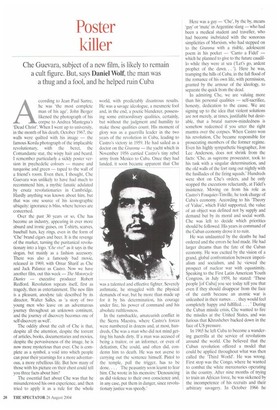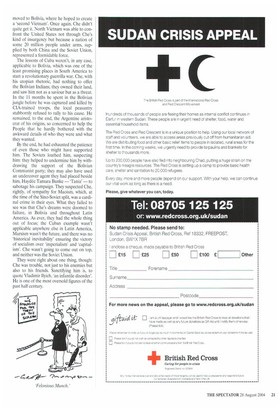Poster killer
Che Guevara, subject of a new film, is likely to remain a cult figure. But, says Daniel Wolf, the man was a thug and a fool, and he helped ruin Cuba According to Jean Paul Sartre, he was 'the most complete man of his age'. John Berger likened the photograph of his corpse to Andrea Mantegna's 'Dead Christ'. When I went up to university, in the month of his death, October 1967, the walls were quilted with his image — the famous Korda photograph of the implacable revolutionary, with the beret, the Comandante star, the wispy hair and beard. I remember particularly a sickly poster version in psychedelic colours — mauve and turquoise and green — taped to the wall of a friend's room. Even then, I thought, Che Guevara was unlikely to have had much to recommend him, a mythic fanatic adulated by ersatz revolutionaries in Cambridge. Hardly anything was known about him, but that was one source of his iconographic ubiquity: ignorance is bliss, where heroes are concerned.
Over the past 30 years or so, Che has become an industry, appearing in ever more absurd and ironic guises, on T-shirts, scarves, baseball hats, key rings, even in the form of 'Che' brand cigars and beer. It is the revenge of the market, turning the puritanical revolutionary into a logo. 'Che vive as it says in the slogan, but mainly as a fashion accessory. There was also a famously bad movie, released in 1969, with Omar Sharif as Che and Jack Palance as Castro. Now we have another film, out this week — The Motorcycle Diaries — executive producer Robert Redford. Revolution repeats itself, first as tragedy, then as entertainment. The new film is a pleasant, anodyne tale described by its director, Walter Salles, as 'a story of two young men who leave on an adventurous journey throughout an unknown continent, and the journey of discovery becomes one of self-discovery as well'.
The oddity about the cult of Che is that, despite all the attention, despite the torrent of articles, books, documentaries and movies, despite the pervasiveness of the image, be is now more mysterious than ever. Che is complete as a symbol, a void into which people can pour their yearnings for a more adventurous, a more rebellious life. But how many of those with his picture on their chest could tell you three facts about him?
The essential fact about Che was that he misunderstood his own experience, and then tried to apply it as a rule for the whole
world, with predictably disastrous results. He was a savage ideologue, a mesmeric fool and, in the end, a poetic blunderer, possessing some extraordinary qualities, certainly, but without the judgment and humility to make those qualities count. His moment of glory was as a guerrilla leader in the two years of the revolution in Cuba, leading to Castro's victory in 1959. He had sailed as a doctor on the Granma — the yacht which in November 1956 carried Castro's tiny rebel army from Mexico to Cuba. Once they had landed, it soon became apparent that Che
was a talented and effective fighter. Severely asthmatic, he struggled with the physical demands of war, but he more than made up for it by his determination, his courage under fire, his power of command and his absolute ruthlessness.
In the ramshackle, amateurish conflict in the Sierra Maestra, where Castro's forces were numbered in dozens and, at most, hundreds, Che was a man who did not mind getting his hands dirty. If a man was accused of being a traitor, or an informer, or even of defeatism, Che could, and often did, condemn him to death. He was not averse to carrying out the sentence himself. Pistol to the temple, pull the trigger, has to be done. . . . The peasantry soon learnt to fear him. Che wrote in his memoirs: 'Denouncing us did violence to their own conscience and, in any case, put them in danger, since revolutionary justice was speedy.'
Here was a guy — `Che', by the by, means 'guy' or 'mate' in Argentine slang — who had been a medical student and traveller, who had become inebriated with the sonorous simplicities of Marxism, who had stepped on to the Granma with a risible, adolescent poem in his pocket — 'Canto a Fidel' — which he planned to give to the future caudillo while they were at sea (Let's go, ardent prophet of the dawn. . '). Here he was, tramping the hills of Cuba, in the full flood of the romance of his own life, with permission, granted by the armour of the ideology, to separate the quick from the dead.
In admiring Che, we are valuing more than his personal qualities — self-sacrifice, honesty, dedication to the cause. We are signing up to the idea that violent solutions are not merely, at times, justifiable but desirable, that a brutal narrow-mindedness is somehow redeemed if you utter the right mantra over the corpses. When Castro won his revolution, Che became responsible for prosecuting members of the former regime. Even his highly sympathetic biographer, Jon Lee Anderson, does not shrink from the facts: `Che, as supreme prosecutor, took to his task with a singular determination, and the old walls of the fort rang out nightly with the fusillades of the firing squads.' Hundreds were shot on Che's orders, and he only stopped the executions reluctantly, at Fidel's insistence, Moving on from his role as Castro's Fouquier-Tinville, he took charge of Cuba's economy. According to his 'Theory of Value', which Fidel supported, the value of an object was defined not by supply and demand but by its moral and social worth. Che was left to decide which priorities should be followed. His years in command of the Cuban economy drove it to ruin.
He was undaunted by the deaths he had ordered and the errors he had made. He had larger dreams than the fate of the Cuban economy. He was excited by the vision of a grand, global confrontation between imperialism and socialism, and he viewed the prospect of nuclear war with equanimity. Speaking to the First Latin American Youth Congress, in July 1959, he stated: 'These people 'of Cuba] you see today tell you that even if they should disappear from the face of the earth because an atomic war is unleashed in their names. . . they would feel completely happy and fulfilled. . . ' During the Cuban missile crisis, Che wanted to fire the missiles at the United States, and was furious that Khrushchev backed down in the face of US pressure, In 1965 he left Cuba to become a wandering guerrilla at the service of revolutions around the world. Che believed that the Cuban revolution offered a model that could be applied throughout what was then called the 'Third World'. He was wrong. First stop was the Congo, where he wanted to combat the white mercenaries operating in the country. After nine months of trying to train an African force, he was sickened by the incompetence of his recruits and their arbitrary savagery. In October 1966 he moved to Bolivia, where he hoped to create a 'second Vietnam'. Once again, Che didn't quite get it. North Vietnam was able to confront the United States not through Che's kind of insurgency but because a nation of some 20 million people under arms, supplied by both China and the Soviet Union, represented a formidable force.
The lessons of Cuba weren't, in any case, applicable to Bolivia, which was one of the least promising places in South America to start a revolutionary guerrilla war. Che, with his utopian rhetoric, had nothing to offer the Bolivian Indians; they owned their land, and saw him not as a saviour but as a threat. In the 11 months he spent in the Bolivian jungle before he was captured and killed by CIA-trained troops, the local peasantry stubbornly refused to rally to his cause. He remained, to the end, the Argentine aristocrat of his origins, so concerned to help the People that he hardly bothered with the awkward details of who they were and what they wanted.
By the end, he had exhausted the patience of even those who might have supported him. The Soviets loathed him, suspecting him: they helped to undermine him by withdrawing the support of the Bolivian Communist party; they may also have used an undercover agent they had placed beside him, Haydee Tamara Bunke — Tania' — to sabotage his campaign. They suspected Che, rightly, of sympathy for Maoism, which, at the time of the Sino-Soviet split, was a cardinal crime in their eyes. What they failed to see was that Che's dreams were doomed to failure, in Bolivia and throughout Latin America. As ever, they had the whole thing out of focus; the Cuban example wasn't applicable anywhere else in Latin America, Marxism wasn't the future, and there was no 'historical inevitability' ensuring the victory of socialism over `imperialism' and 'capitalism'. Che wasn't going to come out on top, and neither was the Soviet Union.
They were right about one thing, though; Che was trouble, not just to his enemies but also to his friends. Sanctifying him is, to quote Vladimir Ilyich, `an infantile disorder'. He is one of the most oversold figures of the past half century.



























































 Previous page
Previous page